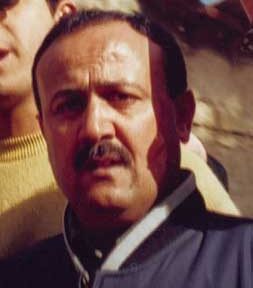
Marwan Barghouti
: Photo from Creative Commons / Author of Photo: BDalimOverview
* Member of the Palestinian Legislative Council
* Founder of the Al-Aqsa Martyrs’ Brigades
Marwan Barghouti is a Palestinian military leader and a member of the Palestinian Legislative Council. He currently heads the al-Mustaqbal, an independent political party formed during the 2006 Palestinian elections which saw the terrorist group Hamas seize control of the Palestinian Authority legislature. Prior to that, Barghouti was the leader of the Fatah organization’s military branches, Tanzim and the Al-Aqsa Martyrs Brigades, which are considered terrorist organizations by the United States.
Born June 6, 1959 in the Palestinian city of Ramallah, Barghouti is a distant cousin of Mustafa Barghouti, founder of the Union of Palestinian Medical Relief Committees. By age fifteen, Marwan Barghouti already had become active in Fatah, the major nationalist Palestinian political party. He was first arrested by Israel in 1976 for his involvement in a Palestinian uprising. After his release, he returned to the West Bank and earned a bachelor’s degree in history and a master’s degree in international relations.
During the First Palestinian Intifada in 1987, Barghouti emerged as one of the Fatah party’s major military figures. He led Palestinians in violent conflicts against Israeli military forces and civilians alike. That same year, he was arrested by Israel and was deported to Jordan, where he remained until 1994, at which time he returned to the West Bank under the terms of the Oslo Accords. In 1996 he was elected to the Palestinian Legislative Council, where he rose in the ranks to the title of Secretary-General of Fatah in the West Bank. However, he subsequently had a falling out with Yasser Arafat, whose administration he accused of corruption.
With the outbreak of the Second Intifada in 2000, Barghouti became a leader of the Al-Aqsa Martyrs’ Brigades. He led marches to Israeli checkpoints, where riots occasionally erupted against IDF (Israeli Defense Force) soldiers. He became a visible presence at many Palestinian demonstrations and funerals covered by the Arab press. In speeches he made at such events, Barghouti exhorted Palestinians to persist in striving to forcefully expel Israel from the West Bank and Gaza Strip.
Under Barghouti’s command, the Al-Aqsa Martyrs’ Brigades were responsible for numerous attacks against Israel, including a March 2002 suicide bombing in a Jerusalem café that killed 11 civilians and wounded more than 50, as well as two January 2003 suicide bombings in Tel Aviv that killed 23 people and injured approximately 100.
In a January 2002 op-ed column in The Washington Post, Barghouti wrote: “Israel will have security only after the end of the occupation, not before…. I am not a terrorist, but neither am I a pacifist. I am simply a regular guy from the Palestinian street advocating what every other oppressed person has advocated — the right to help myself in the absence of help from anywhere else.”
Barghouti was captured by the Israeli Army in Ramallah in April 2002 and was charged with terrorism and the murders of 26 people. Throughout his trial, he maintained his support for armed resistance to the Israeli occupation. Ultimately he was convicted of five counts of murder, each carrying a life sentence.
After Yasser Arafat’s death in 2004, Barghouti announced that he would run, from the confines of his prison cell, for the presidency of the Palestinian Authority (PA) against Mahmoud Abbas; he withdrew his candidacy a few weeks later.
In 2005 Barghouti formed a new political party, al-Mustaqbal, from prison in an effort to prevent Hamas from winning the 2006 PA elections.
In the years since his arrest and terrorism/murder trial, a number of pro-Palestinian and leftwing activists have mobilized a “Campaign to Free Marwan Barghouti & All Prisoners.” Considering itself to be “part of the wider struggle for Palestinian independence and self-determination,” this Campaign holds that “the plights of Marwan Barghouti and other prisoners cannot be separated from the wider issue of the constant violations of international agreements and of Palestinians’ human rights perpetrated by the Israeli state.” The Campaign’s original advisory committee included Hanan Ashrawi, Edward Said, Nelson Mandela, and Noam Chomsky.
During his years in prison, Barghouti has helped to broker some compromises between various Palestinian terrorist groups. In May 2006, a number of prominent incarcerated Palestinians drafted the “National Conciliation Document of the Prisoners,” which proposed the creation of a coalition government in the Palestinian Legislative Council. Barghouti was an architect of that document, as were leaders of Hamas, Palestinian Islamic Jihad, and the Popular Front for the Liberation of Palestine.
In February 2007, Barghouti also played a major role in devising the Hamas & Fatah Mecca Agreement, which urged the two parties to end their inter-factional military clashes in Gaza and to form a Palestinian government of unity.
In early 2017, Barghouti initiated and led a hunger strike that was joined by approximately 1,000 fellow convicted terrorists incarcerated in Israeli jails. Condemning “Israel’s illegal system of mass arbitrary arrests and ill-treatment of Palestinian prisoners,” he added: “Decades of experience have proved that Israel’s inhumane system of colonial and military occupation aims to break the spirit of prisoners and the nation to which they belong, by inflicting suffering on their bodies, separating them from their families and communities, using humiliating measures to compel subjugation.”